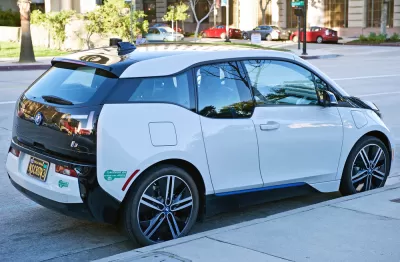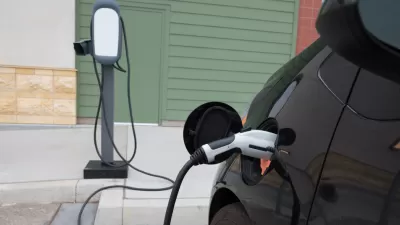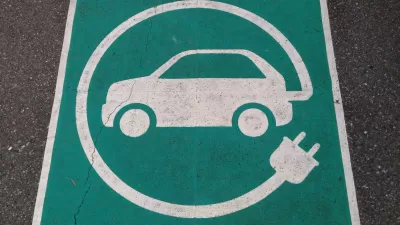On the second day of the Global Climate Action Summit, co-host Gov. Jerry Brown signed 16 bills onboard a new plug-in hybrid electric ferry in San Francisco Bay to spur sales of zero-emission vehicles and reduce greenhouse gas emissions.

"Cruising the San Francisco Bay on a new plug-in hybrid ferry, Gov. Jerry Brown on Thursday evening signed more than a dozen environmental bills that aim to boost the electric vehicle market, particularly among poor Californians, and reinforce the state’s fight against climate change," reports Alexei Koseff of The Sacramento Bee.
“Whether we travel by car, bus, or boat the need to move to zero-emission transportation is urgent. These bills will help get more clean cars on the road and reduce harmful emissions,” Brown said in a statement.
Two days before the start of the summit, Brown had signed an executive order to achieve carbon neutrality and a bill setting a target for 100 percent carbon-free electricity, both by 2045.
Among the 16 bills Brown signed aboard the ferry:
▪ Senate Bill 1014, by Sen. Nancy Skinner, D-Berkeley, which gives state regulators authority to establish emissions reduction targets for ride-hailing services like Uber and Lyft. The bill originally would have required the companies to provide all of their rides in zero-emission vehicles by 2029, but it was scaled back amid opposition from the tech industry. [See: "Should Ride-Hailing Vehicles Reduce Emissions?" June 22, 2018].
▪ Assembly Bill 193, by Assemblywoman Sabrina Cervantes, D-Riverside, which provides rebates for replacement batteries and fuel cells in used vehicles.
This bill creates the Zero-Emission Assurance Project to spur sales of used zero-emission vehicles (ZEVs) to low and moderate income Californians, somewhat similar to the Clean Vehicle Rebate Project for new electric vehicles. According to Cervantes:
Questions about battery life are among the highest ranking concerns that consumers have about the prospect of buying a ZEV, according to an April 2018 study [pdf] by the University of California, Davis [and National Center for Sustainable Transportation]. This concern is well-founded, as the cost of a replacement ZEV battery can range from $5,500 to more than $15,000.
Another bill to place more used electric vehicles in the hands of low and moderate income residents is Senate Bill 957, by Sen. Ricardo Lara, D-Bell Gardens, which allows low-income Californians to obtain carpool lane stickers for clean cars bought secondhand. Brown signed three additional bills by Lara at the climate summit, including:
- SB 1000 which requires the state to assess whether vehicle-charging infrastructure, including fast-charging access, is deployed fairly by income level, population density, and geographical area. It also requires publicly funded charging stations to be accessible to all-electric vehicles, including plug-in hybrids.
Koseff describes several more bills that reduce greenhouse gas emissions and criteria pollutants. He also reported on the protestors that grabbed much media attention as it showed that there is division among climate activists.
Outside [the Moscone Convention Center], hundreds of protesters calling for an end to oil drilling disputed Brown’s own achievements and the purpose of the summit, which they said promoted “false solutions” at the expense of local communities that are bearing the brunt of climate change’s impact.
Some environmental activists accuse Brown of being too closely tied to the oil industry. They sharply criticize his reluctance to limit oil production in California, which they argue would do more to benefit the environment and emissions reduction goals than policies Brown has favored, like cap-and-trade.
[See Keep it in the Ground – 2018: As climate hawks gather in San Francisco for the Global Climate Action Summit that convenes Wednesday, Gov. Jerry Brown, host of the summit, is dogged by critics who can't distinguish between oil production and consumption.]
All 16 bills are listed and described in the (Global Climate Action) Summit News. As for Executive order B-55-18 [pdf], establishing a new target to achieve carbon neutrality by 2045, Evan Halper reports for The Los Angeles Times that it "was so far-reaching and unprecedented that it was met with considerable skepticism."
The ambitious plan raised immediate questions. As an executive order, is it even binding? Does California have any plan in place for a complete decarbonization of its economy?
[Brown] acknowledged that getting to carbon neutrality requires “technological changes that don’t exist yet” and his measure is aimed at bolstering their innovation.
“This is a transformation that is called for that we will get to,” he said. “This is the boldest move that I have seen certainly anywhere in the U.S.”
If that language has you thinking "Gov. Moonbeam," a term coined in 1976 by the Chicago columnist Mike Royko in part due to Brown's desire to launch a satellite during his first term as governor, Royko would be laughing in his grave if he could have heard how the summit ended.
"In closing remarks at the Global Climate Action Summit, Governor Edmund G. Brown Jr. today [Sept. 14] announced that the State of California is teaming up with San Francisco-based Earth-imaging company Planet Labs (Planet) to develop and eventually launch a satellite that will track climate change-causing pollutants with unprecedented precision and help the world dramatically reduce these destructive emissions," according to Summit News.
"With science still under attack and the climate threat growing, we’re launching our own damn satellite,” said Governor Brown.
Related:
-
An exemption to an existing law was removed Monday when Gov. Jerry Brown signed a bill that affords tenants in rent-controlled buildings the same right to request electric vehicle charging capability as renters in unregulated apartments.
-
A Dozen New Laws to Spur Sales of Zero Emission Vehicles in California, October 13, 2017Gov. Jerry Brown signed 12 bills on Oct. 10 to facilitate the transition from oil-powered light and heavy-duty vehicles to electric power in California, and thus meet his goal of putting 1.5 million zero-emission vehicles on the road by 2025.
-
With comprehensive legislation to enable California to continue its powerful agenda of tackling climate change in peril, a Southern California assemblywoman will introduce legislation to tackle the specific issue of sales of electric vehicles.
FULL STORY: Brown deems Trump ‘liar, criminal, fool’ on environment, signs electric vehicle bills

Alabama: Trump Terminates Settlements for Black Communities Harmed By Raw Sewage
Trump deemed the landmark civil rights agreement “illegal DEI and environmental justice policy.”

Study: Maui’s Plan to Convert Vacation Rentals to Long-Term Housing Could Cause Nearly $1 Billion Economic Loss
The plan would reduce visitor accommodation by 25% resulting in 1,900 jobs lost.

Planetizen Federal Action Tracker
A weekly monitor of how Trump’s orders and actions are impacting planners and planning in America.

Wind Energy on the Rise Despite Federal Policy Reversal
The Trump administration is revoking federal support for renewable energy, but demand for new projects continues unabated.

Passengers Flock to Caltrain After Electrification
The new electric trains are running faster and more reliably, leading to strong ridership growth on the Bay Area rail system.

Texas Churches Rally Behind ‘Yes in God’s Back Yard’ Legislation
Religious leaders want the state to reduce zoning regulations to streamline leasing church-owned land to housing developers.
Urban Design for Planners 1: Software Tools
This six-course series explores essential urban design concepts using open source software and equips planners with the tools they need to participate fully in the urban design process.
Planning for Universal Design
Learn the tools for implementing Universal Design in planning regulations.
Caltrans
Smith Gee Studio
Institute for Housing and Urban Development Studies (IHS)
City of Grandview
Harvard GSD Executive Education
Toledo-Lucas County Plan Commissions
Salt Lake City
NYU Wagner Graduate School of Public Service




























